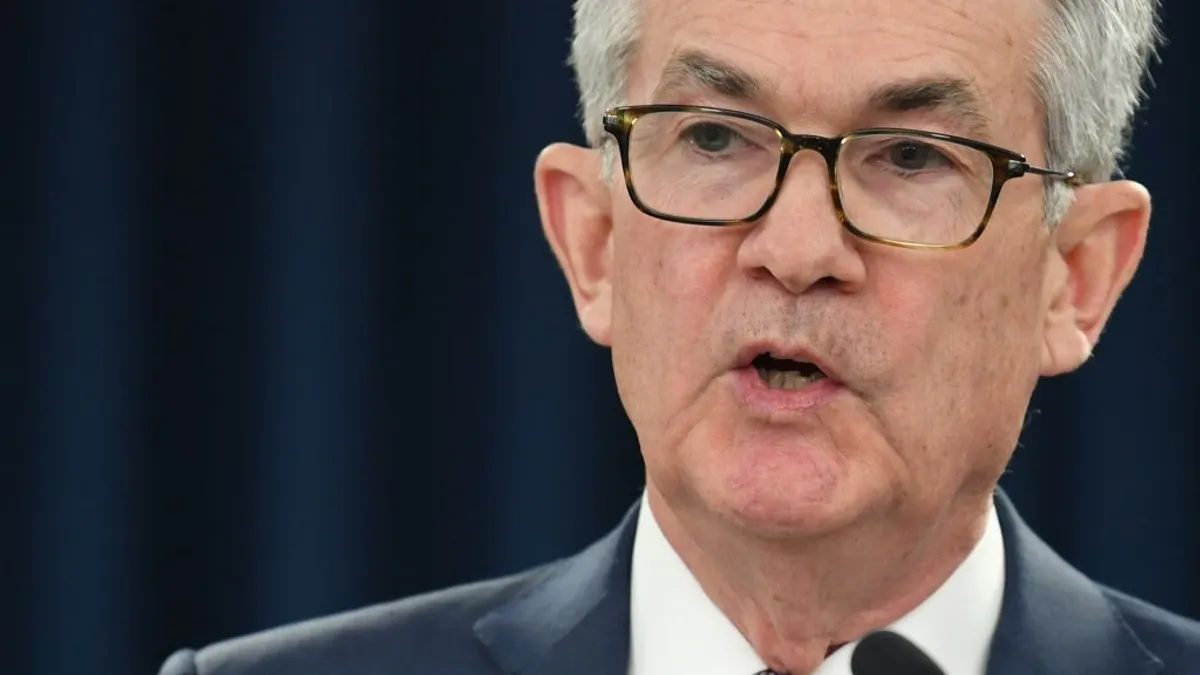CFOs — along with President-elect Donald Trump and Federal Reserve officials — step into 2025 walking a tightrope.
Fed policymakers, seeking to bolster the labor market and avert a downturn, have cut the main interest rate by 1 percentage point since September. Yet as inflation persists above their 2% goal, they must guard against a rebound in price pressures in 2025.
Trump, after riding public resentment over rising prices to a second term as president, promises to pursue two policies that may spur inflation: blanket tariffs and the deportation of millions of undocumented immigrants.
In the name of innovation and free markets, Trump has also signaled a softening in crypto and other regulation despite the prospect of excessive risk-taking and financial turmoil.
Meanwhile, CFOs face pressure to gain an edge against rival companies through artificial intelligence, while ensuring the rapidly evolving technology yields a high return. They also must meet the growing demand to broaden their operational and strategic skill sets while not neglecting core CFO responsibilities such as budgeting and capital allocation.
Financial executives can consider gaining an edge in 2025 by tracking six developing trends in federal policy and business strategy:
1. Tariffs: ‘The most beautiful word’
The pledge by Trump to impose tariffs of at least 10% on imports from China and 25% on goods from Canada and Mexico poses the risks of higher prices for consumers, higher costs of imported goods bought by U.S. companies and the prospect of a multi-front trade war, according to economists and trade experts.
Trump disagrees, saying levies on imports will help create jobs, boost investment and raise revenue, narrowing the budget deficit.
“I'm a big believer in tariffs: I think tariffs are the most beautiful word,” Trump said in a Dec. 8 interview on “Meet The Press.” “It's going to make us rich.”
Resistance is fierce from some companies. Top executives at Walmart, Lowe’s, and Stanley Black & Decker have said they will react to higher import costs by raising prices.
Indeed, a 20% worldwide tariff and 60% tariff on imports from China — as proposed by Trump during his presidential campaign — would increase taxes paid by households next year by an average of nearly $3,000 and reduce imports by $9 trillion over 10 years, according to the Tax Policy Center.
CFOs will need to plan for a broad range of outcomes and prepare for the worst scenario, according to Lee Branstetter, a professor of economics at Carnegie Mellon University. Many CFOs may seek to limit risk by postponing investment in their company.
“We’ve got a president who is basically going to be generating random tariff policy,” Branstetter said in an interview. Tariffs “could be imposed at will, modified at will, rescinded at will, reinstated at will — so, Mr. CFO, try to plan around that.”
2. Financial regulation: Less ‘babysitter’
CFOs needled by the comparatively sharp approach to financial regulation by the Biden administration can expect a softer touch from the Securities and Exchange Commission under the Trump administration, according to attorneys and former SEC officials.
On topics ranging from regulation of crypto markets to disclosure of cybersecurity risks, Paul Atkins, Trump’s nominee to lead the SEC’s, will likely work more collaboratively with investors, market makers and issuers of securities than SEC Chair Gary Gensler, they said.
“Their approaches are going to be vastly different,” with Atkins emphasizing ways to promote capital raising while also ensuring “safe and productive capital markets,” Alston & Bird attorney Dave Brown said.
Referring to Atkins, Brown said, “I think he’ll be much less of a baby sitter.”
For example, Atkins will probably shelve a climate-risk disclosure rule.
The regulation requires companies to publish the impact of climate change on their finances, operations and business strategy. The SEC this year blunted the rule, approved it and then put it on hold in the face of legal challenges.
The SEC under Trump may also scuttle Gensler’s effort to regulate crypto assets as securities, giving greater leeway to innovation but increasing investor risks.
In another pullback that may intensify risk, the SEC will likely scale back enforcement, forgoing broad crackdowns such as the sanctions against several Wall Street firms for not halting off-channel communications among staff, according to the attorneys and former SEC staff.
“You’ll see much more rational, focused SEC enforcement,” Brown said.
3. The Fed’s ‘very, very cautious policy’
Fed Chair Jerome Powell faces the prospect that inflation will stall above the central bank’s 2% target throughout the new year, fueled in part by policies proposed by Trump.
Trump’s planned tariffs may prompt tit-for-tat reprisals by trade partners, increasing import prices. Mass deportation of unauthorized immigrants may crimp labor supply, pushing up wages.
In light of stubborn price pressures, Fed officials in a median estimate released on Dec. 18 postponed from this year to next their forecast for successfully subduing inflation to their target.
Powell will likely get little to no help in corralling inflation from Congress and Trump, Olu Sonola, Fitch Ratings head of U.S. economic research, said in an interview.
“I doubt that Congress is paying attention to the inflationary effect of fiscal policy,” he said. Meanwhile, Trump will “argue that his tariffs are going to be good for everybody, and that inflation will not be a problem,” Sonola said.
Fitch Ratings sees economic growth slowing from as much as 3% in 2024 to 2.1% this year, he said.
Yet even with the economy cooling, the likelihood of tariffs and other factors prompted Fitch to increase its estimate for the rise in the consumer prices index in 2025 to 2.8% from 2.4%, Sonola said.
The Fed “will be very, very cautious” this year, he said, forecasting that policymakers will not change the federal funds rate before May and will make just two, quarter-point cuts in 2025.
“You’re going into a forecast terrain that is very, very cloudy,” Sonola said, noting especially the ambiguity of Trump’s approach to import taxes and immigration.
4. Seeking ‘CFO-plus’
Many companies seeking new finance chiefs in 2025 will likely favor prospects who offer “CFO-plus,” or operational and strategic skills along with financial expertise, according to Josh Crist, co-managing partner of executive search firm Crist Kolder Associates.
“We're starting to see a generation of CFOs which has clearly proven itself to senior leadership, board members,” Crist said in an interview. “They can take on more. They're being given more.”
The new operational responsibilities include technology implementation and supply chains, Crist said. They are also more deeply engaged with business strategy and investor communication, Jim Lawson, co-leader of executive search and leadership advisory firm Russell Reynolds Associates’ CFO practice, said in an interview.
CFOs with savvy in company operations pack special appeal as candidates for the CEO seat, according to Jenna Fisher, co-leader of RRA's CFO practice.
Indeed, most CFOs plan to ask for more responsibilities within the next three years, RRA found in a survey.
As CFOs take on more duties, many finance functions are seeing a “layering effect,” where companies hire additional talent in positions such as vice president of finance to handle work formerly under the CFO’s direct purview, Crist said.
Many CFOs are also stepping off the traditional paths to the top financial seat, experts said.
Just 34% of CFOs at Standard & Poor’s 500 companies are CPAs, according to RRA. Moreover, the proportion of CFOs who are certified public accountants is falling, Fisher and Crist said.
“I can't remember the last time a large public company asked me to include CPA necessary in our specs,” Crist said.
5. AI ROI: dream or delusion
CFOs in the new year will see no easing in pressure to harness the competitive advantage of artificial intelligence while ensuring that the technology yields a solid return on investment, according to analysts.
AI innovation will probably persist at a frenetic pace, they said, intensifying the challenge for the many executives who feel they have failed in AI adoption.
“2025 will usher in a pivotal shift for AI, moving beyond the rapid growth and hype of recent years toward a more grounded and practical phase,” Assaf Melochna, co-founder of Aquant, an AI company based in New York City, said in an email.
A new type of generative AI application is emerging as Microsoft, Salesforce and other software vendors roll out AI agents capable of fraud detection, financial data reconciliation and other tasks.
One out of four enterprises currently using generative AI will probably deploy AI agents in 2025, according to research by Deloitte, and that proportion will likely rise to half by 2027.
Meanwhile, global spending on information technology will likely surge 9.3% in 2025 to $5.74 trillion, largely driven by demand for AI, according to Gartner.
Both sellers and users of AI will channel their energies toward practical solutions in 2025, Melochna predicted.
“Instead of focusing on catchy terms, discussions will center on addressing real-world challenges — closing learning gaps, overcoming deployment hurdles and delivering measurable outcomes,” he said.
6. Confronting the accountant shortage
The shortage of qualified accountants — and the risks of error that stems from it — will likely persist in 2025 despite industry efforts to widen the pipeline of talented prospects, according to accounting experts.
As a result, CFOs aiming to expand their staff may face difficulty in 2025 drawing from today’s smaller pool of qualified accountants to find candidates capable of generating accurate and timely financial reports, the experts said.
“We are already seeing the effects of the pipeline collapse on accounting quality at companies being audited, so to me it’s only a matter of time until the lack of qualified personnel leads to an audit failure,” Jack Castonguay, an associate professor of public accounting at Hofstra University, said in an email.
Strains from the talent shortfall are clear, Castonguay said, noting that in SEC filings, companies including Tupperware and Advanced Auto Parts identified turnover or a lack of qualified accounting personnel as causes for missed deadlines and other problems.
Companies offering good compensation and benefits will likely attract the best talent while others can limit the risk of errors by spending more on training, according to Omar Roubi, an instructor of accounting at the University of Colorado Denver.
Some employers “might not be able to hire as much when it comes to headcount but they have other levers they can pull to ensure” high quality financial reporting, Roubi said in an email.
At the same time, “less talent, less experience only increases the chance of reporting errors, deficiencies,” he said.
Editor’s note: Alexei Alexis, Grace Noto and Maura Webber Sadovi contributed to this report. Separately, this story has been updated to show that Aquant is based in New York City.























